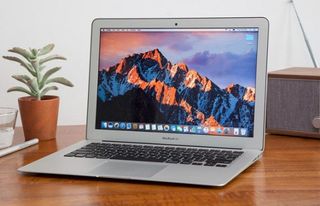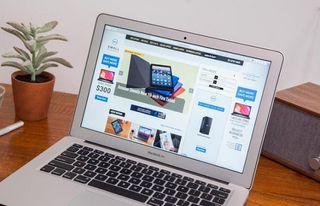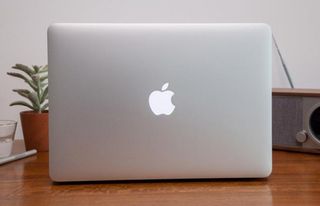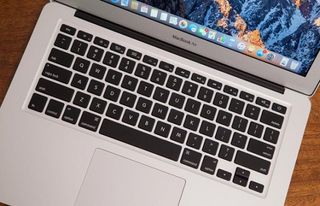MacBook Air 2018: Can Apple Stage a Comeback?
There is perhaps no consumer technology in greater need of a refresh than the MacBook Air.

Apple has been riding the wave of its lowest-price laptop for years, but it could soon come crashing down if the Cupertino giant doesn't make radical changes. Competition in the laptop industry is greater than ever, with challengers like the Dell XPS 13 and the Microsoft Surface Pro proving worthy opposition to MacBooks.
The MacBook Air, in its current state, is more or less the same laptop Apple released in 2010, but with internals from 2015. A newly designed Air is long overdue; fortunately, we might not have to wait much longer.
MORE: Best Apple Laptops 2018
Apple is rumored to be releasing a cheaper MacBook Air later this year. As is typical of Apple secrets, details about the new laptop are scarce. But as the release of a new lowest-priced Apple laptop grows imminent, analysts aren't convinced the refresh will disrupt the market, or even introduce exciting features to a segment desperate to regain attention.
A new MacBook Air is (probably) coming
There are questions as to where a new MacBook Air could slot into Apple's current laptop lineup. With the 12-inch MacBook acting as the most portable option, and the MacBook Pro as the most powerful, it would seem there is little room for the Air to breath. In fact, several reports over the past few months claim Apple will discontinue the MacBook Air altogether.
Stay in the know with Laptop Mag
Get our in-depth reviews, helpful tips, great deals, and the biggest news stories delivered to your inbox.

The MacBook Air's demise remains a possibility, but according to analysts, the laptop continues to sell well, despite lagging behind the competition in several key areas.
"Most of the customers who are buying [MacBook Air] are buying it because they want the operating system and they're willing to make compromises on the hardware," Stephen Baker, vice president of industry analysis at NPD, told Laptop Mag. "And they want to get to certain price points. We've actually seen the entry-level of Mac-type products grow in the past few months."
"[Apple] clearly needs to have something a little bit more affordable in the line, and maybe something a little bit more mainstream than the [12-inch] Macbook." — Stephen Baker, VP of industry analysis, NPD
It's reasonable to conclude that Apple will not do away with the MacBook Air anytime soon, given its steady sales growth and the demand for a lower-cost macOS laptop. And if Apple does unveil a new MacBook Air, it will likely sell for around the same price. In March, Bloomberg reported that a "new, cheaper MacBook laptop is in the works and likely destined to replace the MacBook Air at a price less than $1,000."
MORE: Apple MacBook Pro 15 vs. Dell XPS 15: Which Is Right for You?
"I would suspect that the base prices will be someplace between $799 and $999," Baker said. "I don't see any change in how they would want to market or slot the Macbook Air within the product family. They clearly need to have something a little bit more affordable in the line, and maybe something a little bit more mainstream than the [12-inch] Macbook."
Keep your expectations in check
For the past few release cycles, Apple has focused attention to the MacBook Pro, introducing a new Touch Bar and keyboard switch, among other iterative changes. While the MacBook Pro and 12-inch MacBook soaked up the spotlight, the MacBook Air fell far behind comparatively priced Windows laptops.

The question now is, what can Apple can do to make the MacBook Air relevant again, and keep the price below $1,000? First, the Air will need to catch up to premium Windows Ultrabooks with improved components and new features.
"I think the screen is the thing that most people have the biggest issue with," Baker said. "I think that's clearly something that, within the parameters of under $1,000, they can get a full-HD screen without impacting the overall price too much. Certainly there are Windows-equivalent products out there with a better screen than the MacBook Air has."
He continued, "From there it's all about choices: how much storage do you want to offer, how much RAM do you want to offer, what's the right processor? Apple is a little more willing to have lesser features on the hardware side because they believe they have an advantage in terms of the operating system and the loyalty that the operating system engenders."
A new display and updated internals would, at the very least, bring the MacBook up to pace with other sub-$1,000 laptops on the market. Other additions Apple could make to differentiate itself from the competition would be to inject some of the innovations found in the MacBook Pro into the MacBook Air. Those include a Touch ID fingerprint sensor for more secure, faster login, or the Touch Bar shortcut controls. But if Apple adds too many features, it could make even its cheapest laptop prohibitively expensive for many users.
"They're not going to do a zillion things here," Baker said. "The product is designed to be the entry-level product family inside MacBooks. Certainly you don't want to do so many features inside of it to get the price up to a point where it's no longer the entry-level product — where they can no longer sell it for $899, $999."
But even if a new MacBook Air offers refreshed internals and an improved display, the machine would still be lacking one crucial feature that is increasingly found on Windows laptops: Touch. And you shouldn't hold your breath for it, either, based on Apple's reluctance to embrace a 2-in-1 design.
MORE: New MacBook Air Finally Coming with Retina Display, Thinner Bezels
"There are a few things that Windows has that Mac doesn't have, for instance, touch," said Mikako Kitagawa, a principal research analyst at Gartner. " But even if Mac is going to have those, will it increase the number of buyers? I don't think so. There is no such killer functionalities and killer specifications at the moment."
Low price, but no sales miracle
Apple will reportedly cut the price of a new MacBook Air by several hundred dollars. While a radical price reduction would be a surefire way to grab headlines, it could end up backfiring on a company that prides itself on producing premium products.

"If they [Apple] lower the price and shrink the margin, then their profitability is going to go down but the revenue is going to go up if the volume goes up," Kitagawa said. "There are risks around that. If you have a low price, you need to use low-priced components and that means low-quality components, and hardware failure is going to go up."
Because Apple is expected to take a conservative approach with the MacBook Air, analysts aren't expecting record-breaking sales figures, either. Rather, the Air could find itself in a similar sales pattern as the iPhone.
"The bottom line is, it will likely have the same typical bounce that you'll get out of a new release, but over the last few years, those bounces have become shorter and less peaky then they have been in the past," Baker said.
Credit: Laptop Mag
Phillip Tracy is the assistant managing editor at Laptop Mag where he reviews laptops, phones and other gadgets while covering the latest industry news. After graduating with a journalism degree from the University of Texas at Austin, Phillip became a tech reporter at the Daily Dot. There, he wrote reviews for a range of gadgets and covered everything from social media trends to cybersecurity. Prior to that, he wrote for RCR Wireless News covering 5G and IoT. When he's not tinkering with devices, you can find Phillip playing video games, reading, traveling or watching soccer.
